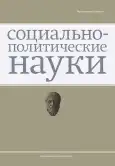Changes in the Policy of the Russian Federation in Relation to the International Terrorist Threat at the Beginning of the XXI Century
- Authors: Gutenev Y.Y.1
-
Affiliations:
- Institute of Oriental Studies of the Russian Academy of Sciences
- Issue: Vol 13, No 1 (2023)
- Pages: 138-144
- Section: International Relations, Global and Regional Studies
- URL: https://bakhtiniada.ru/2223-0092/article/view/147814
- DOI: https://doi.org/10.33693/2223-0092-2023-13-1-138-144
- ID: 147814
Cite item
Abstract
The article examines the approach of the Russian Federation to the growth of terrorism affecting international relations over the past two decades. The article assesses the impact of this threat on the security of our country, on the international situation, and analyzes the decisions taken by the Russian leadership on this issue. The author attempts to consider and describe the influence of the Russian Federation on the ongoing domestic and foreign policy events related to terrorism and religious extremism, designated by the President of the Russian Federation. Attention is also paid to the reasons changing this approach to security in the Russian Federation over the past twenty years. The reasons for the development of new systems of countermeasures by Russia, its entry into a new era of relations with other states, despite their differences, are considered. In turn, the author wants to draw attention to such questions as: “Why is Russia forced to respond to challenges and threats and constantly improve its legislative framework and what changes have taken place in the field of its information security?”. Official documents, United Nations resolutions, sources and scientific works are analyzed in the context of the approach to ensuring security against terrorism. The study shows that the number and quality of threats will continue to increase as terrorist groups gain experience and hone their skills. The fight against terror is possible only in the long term with high-quality international cooperation between States and in the absence of double standards.
Full Text
##article.viewOnOriginalSite##About the authors
Yuriy Yu. Gutenev
Institute of Oriental Studies of the Russian Academy of Sciences
Author for correspondence.
Email: yuriygutenev@yandex.ru
ORCID iD: 0000-0001-6236-9792
postgraduate student, Centre for the Study of Common Problems of the Contemporary East
Russian Federation, MoscowReferences
- Budnitsky O.V. Terrorism in the Russian liberation movement: Ideology, ethics, psychology (second gender XIX – beginning XX century). 2nd ed. Moscow, ROSSPEN, 2016. Pp. 59–65.
- Military Doctrine of the Russian Federation. Approved by decree of the President of the Russian Federation No. 706 21.04.2000.
- Military Doctrine of the Russian Federation. Approved by decree of the President of the Russian Federation No. 146 05.02.2010.
- Military Doctrine of the Russian Federation, art. 13, item “b”. Approved by decree of the President of the Russian Federation No. Pr-2976 25.12.2014.
- The UN Global Counter-Terrorism Strategy, art. 18, part 2. Resolution of the UN General Assembly No. 60/288 dated 08.09.2006.
- The Doctrine of Information Security of the Russian Federation. Order of the President of the Russian Federation No. Pr-1895 dated 09.09.2000.
- Convention on Ensuring International Information Security (concept). 22.09.2011. URL: https://www.mid.ru/foreign_ policy/official_documents/-/asset_publisher/CptICkB6BZ29/ content/id/191666 (data of accesses: 15.10.2021).
- The Concept of the Foreign Policy of the Russian Federation. The Order of the President of the Russian Federation № Pr-251 dated 12.02.2013.
- The Concept of Foreign Policy of the Russian Federation. Approved the President of the Russian Federation. 15.07.2008. No. Pr-1440.
- The Concept of the Foreign Policy of the Russian Federation. Approved by decree of the President of the Russian Federation No. 640 05.12.2016.
- The Concept of the Foreign Policy of the Russian Federation. 28.06.2000. Rossiyskaya Gazeta. 15.07.2008. No. 133. (In Rus.)
- The Concept of National Security of the Russian Federation. Approved by decree of the President of the Russian Federation No. 24 10.01.2000.
- The Concept of Countering Terrorism in the Russian Federation. Approved the President of the Russian Federation. 05.10.2009. Rossiyskaya Gazeta. 20.10.2009. No. 198. (In Rus.)
- Measures to Counter Terrorism. Approved by decree of the President of the Russian Federation No. 116 15.02.2006.
- Miloslavskaya T.P. The origins of radical Islam. In: South-East Asia: Actual problems of development. Moscow: IV RAS, 2017. Issue 35. Pp. 258–266.
- Olshansky D.V. Psychology of terrorism. St. Petersburg: Piter, 2002. Pp. 83–86.
- Fundamentals of the State Policy of the Russian Federation in the field of naval activities for the period up to 2030. Approved by decree of the President of the Russian Federation No. 327 20.07.2017.
- Resolution of the UN General Assembly No. 71/291. Adopted by the UN General Assembly at the seventy-first session 15.07.2017. Agenda item 118.
- UN Security Council Resolution No. 1373. Adopted by the Security Council at the 4385th meeting 28.09.2001.
- UN Security Council Resolution No. 1617. Adopted by the Security Council at the 5244th meeting. 29.07.2005.
- UN Security Council Resolution No. 1860, art. 5. Adopted by the Security Council at the 6063rd meeting 08.01.2009.
- UN Security Council Resolution No. 1904. Adopted by the Security Council at the 6247th meeting 17.12.2009.
- The National Security Strategy of the Russian Federation until 2020. Approved by decree of the President of the Russian Federation No. 537 12.05.2009.
- National Security Strategy of the Russian Federation. Approved by decree of the President of the Russian Federation No. 683 31.12.2015.
- National Security Strategy of the Russian Federation No. 400. Approved by decree of the President of the Russian Federation 02.06.2021.
- Strategy of Countering Extremism in the Russian Federation until 2025. Approved by decree of the President of the Russian Federation No. 344 01.06.2020.
- UN Charter Chapter VII: Actions in relation to threats to peace, violations of peace and acts of aggression, art. 51. URL: https://www.un.org/ru/about-us/un-charter/chapter-7 (data of accesses: 14.10.2021).
Supplementary files








